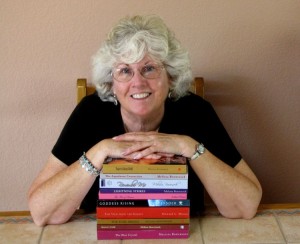 Guest post
Guest post
by Melissa Bowersock
I’m a novelist by trade; the current count stands at nine. That count ranges over the various genres of action, romance, fantasy, western, spiritual and satire. As you can see, I like variety and I will tell any kind of story that grabs me by the throat, drags me to my chair and insists on being written down.
I’ve also learned that every story will demand a different voice. The romance novels will often have a more flowery style to them while the action stories are more clipped and direct. My spiritual novel, Goddess Rising, demanded an almost archaic voice, while my satire of romance novels, The Pits of Passion, bounced irreverently between gushing descriptions and off-the-cuff puns. The voices seem to arise naturally out of the story and require very little effort on my part.
So when I was inspired to write the true story of my aunt, an Army nurse and a prisoner-of-war during World War II, I thought, “No big deal.” I’m an author; I should be able to “auth” any kind of story there is, right? Continue reading “Changing Voices”



